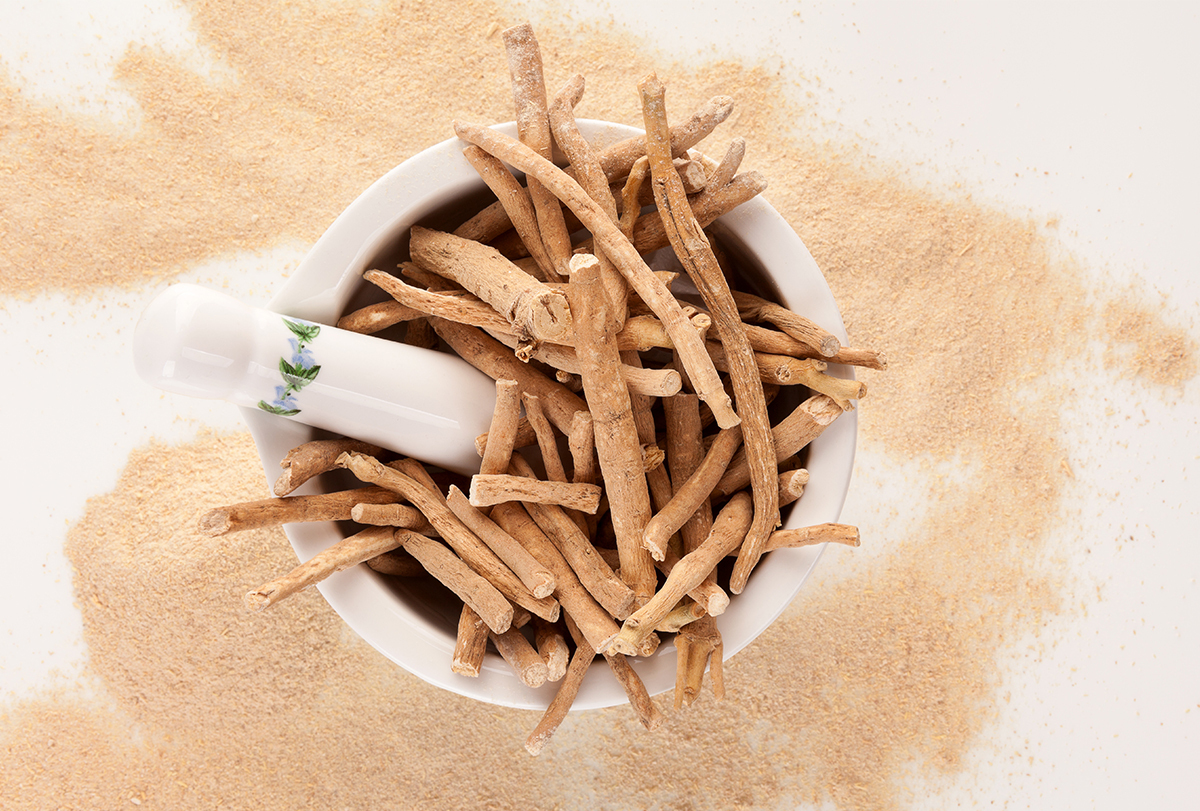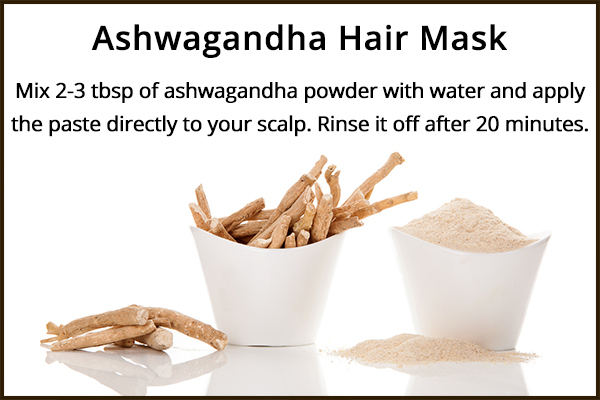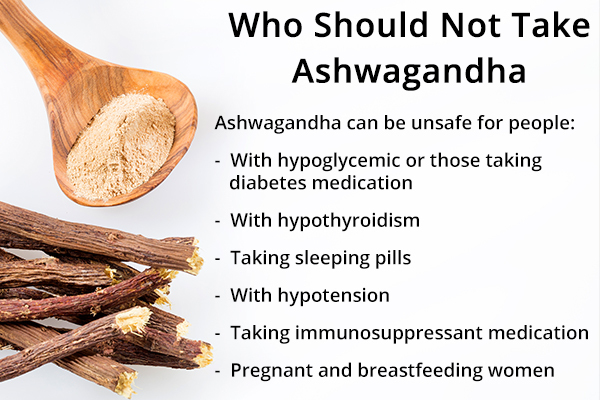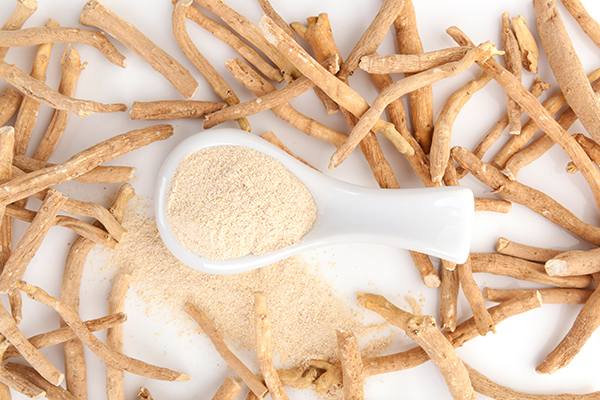Ashwagandha (Withania somnifera), also known as Indian ginseng, is a perennial shrub indigenous to the subtropical regions of Asia and Africa.

Ashwagandha provides many benefits to your body but this article will focus only on the hair benefits of ashwagandha.
Ashwagandha has a high concentration of flavonoids that supply antioxidants, glycoprotein, iron, vitamin C, potassium, tannins, and nitrate, all of which are great for healthy hair growth.

Ashwagandha Benefits for Hair
Here are the four reasons why ashwagandha benefits your hair:
1. Promotes hair growth and fights hair loss
According to a 2019 study, ashwagandha can help promote hair regrowth. (3) It does so by improving blood circulation in the scalp and thus delivering more nutrients to the hair follicles.
Plus, ashwagandha contains a good amount of hair-nourishing vitamins and minerals that stimulate the hair follicles to grow healthier and stronger. This rush of blood, oxygen, and nutrients can help activate dormant hair follicles and improve the overall texture or quality of your tresses. (4)
On account of these properties, ashwagandha is promoted as a potential treatment for hair thinning and hair loss. (3)
2. Prevents graying of hair
Ashwagandha is loaded with antioxidants that counter the harmful effects of free radicals.
Free radicals are reactive molecules that release oxidative stress, causing damage to the hair follicles and thus impeding hair growth. Free radicals also destroy the pigment-producing cells called melanocytes (which give your hair its color), resulting in premature graying of hair. (5)
3. Strengthens the hair roots
Hair roots become weak over time, mainly due to poor nutrition and the onslaught of external heat and dirt.
The nutrients and antioxidants found in ashwagandha can help reduce and repair this damage to strengthen your hair roots. (1) Stronger hair roots mean lesser hair fall.
4. Soothes scalp inflammation
Scalp inflammation can lead to itching and irritation while also hampering hair follicle function.
The antioxidant property of ashwagandha decreases scalp inflammation. (1) A healthy scalp is essential for proper hair follicle activity that can support healthy hair growth.
Ways to Use Ashwagandha on Scalp and Hair
Here are some ways in which ashwagandha can be used to improve your overall hair health.
1. Ashwagandha hair mask

- Mix 2–3 tbsp of ashwagandha powder with water to create a paste.
- Apply the paste directly to your scalp (or hair roots)
- Rinse it off after 20 minutes.
2. Ashwagandha hair products
You can buy hair products that contain ashwagandha. You can also add ashwagandha powder to your regular shampoo and allow the mixture to sit on your scalp for 10 minutes before rinsing it off with cold water.
3. Oral supplements
Ashwagandha supplements are available on the market, but it’s best to consult your dermatologist before starting the supplements for the right dosage and to avoid any adverse reactions. (3) Typically, a dosage of 300 mg of extract twice daily is considered safe. (3)
Side Effects of Ashwagandha Overdose
Excessive intake of ashwagandha can lead to the following side effects:
- Drowsiness
- Headache
- Stomach ache
- Accelerated heartbeat
- Allergic reactions (6)
Who Should Not Take Ashwagandha?

Medicinal intake of ashwagandha can be unsafe in the following cases:
- Ashwagandha is known to exhibit antidiabetic effects, which can make your blood sugar drop dangerously low if you are already hypoglycemic or taking diabetes medication.
- Ashwagandha is known to stimulate the release of thyroid hormones. Avoid the use of ashwagandha if you are suffering from hyperthyroidism or taking hormone replacement (thyroxine) therapy for hypothyroidism.
- Ashwagandha exhibits sleep-inducing properties that can enhance the effect of sleeping pills, such as benzodiazepines, when used concomitantly. This can lead to excessive sedation.
- Since ashwagandha is known to lower blood pressure, it can prove dangerous for those already suffering from hypotension or those taking antihypertensive drugs. It could alter the state of an individual with low blood pressure.
- People suffering from autoimmune conditions take immunosuppressant medication to curb their overactive immune response. Ashwagandha’s immune-boosting property can counteract this action and can be particularly dangerous in cases of organ transplant.
- Pregnant and breastfeeding women are advised against taking ashwagandha.
How Much Time Does It Take for Ashwagandha to Work on Hair?

When used for hair health and hair regrowth, ashwagandha can take almost 12 weeks to show results. (3)
Final Word
Ancient medicine has upheld the hair-enhancing properties of ashwagandha for centuries, and this medicinal plant is now increasingly used in herbal hair products as well due to the benefits it provides to your hair.
Unlike regular hair products, herbal shampoos, hair masks, and conditioners generally contain natural ingredients with little to no chemicals. This is the major reason they have become so popular. (7)
Ashwagandha is one such ingredient that can help nourish, repair, and strengthen your hair while also promoting hair growth. However, you must use it properly and consistently for some time to get results.
Moreover, a single ingredient cannot solve your hair woes or transform your health. The idea is to use it as part of a stringent hair care routine coupled with a healthy diet and lifestyle.
- Was this article helpful?
- YES, THANKS!NOT REALLY


